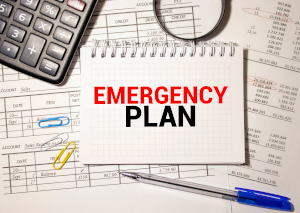Assume it will happen

By Kevin Marois

I’ve talked about disasters like flood or fire in past months (read that here), but there are other situations you need to be prepared to face. A little preparation and staff training will reduce the impact of one of these events.
“Small” Disasters
What if your dry cleaning machine, boiler or washer quits and won’t be running for 3 weeks? Don’t say it won’t happen. Manufacturers have reduced parts inventory. Maybe they have to get that critical part from their supplier. Or maybe the part has to be manufactured. We have two plants in that situation right now. Do you stock some spare parts? Have you got a backup supplier for equipment parts?

Some customers install backup machines so they are never down. They have second boilers, air compressors, dry cleaning machines etc. If you do cleaning for a hotel, they are very unforgiving if you can’t deliver on time.
What if a car drives through your front window? Don’t laugh—we know of five or six occasions where that has happened. One plant put large concrete barriers in front of the store to make sure it didn’t happen again. Two other stores just closed. What could you do to protect your business?
Violence
Domestic violence is becoming more common. Are you aware of the signs to watch for? Civil unrest is another new problem. It is becoming common to see businesses vandalized after a sports championship. Some businesses board up windows. I heard of one company that used rental vehicles the night of the big game. It was a good choice—the rental vehicle was destroyed by an out-of-control mob.

Another situation you might face is robbery or a break-in. Your staff needs to be instructed to turn over the money immediately and not try to be a hero. A break-in is different because the crime is usually done before you are aware of it. Dealing with the insurance claim and unhappy customers is the situation with a break in. When you want to make a claim on your insurance, you will have to document your loss. What did you have? You’ll need model and serial numbers, current values for equipment or tools, etc.. Do you have a current backup of your data if they steal your computers?
Internal crises

A chemical spill is all too likely over the time you own your business. Have you trained your people what to do in such a situation? Where are the cleanup supplies? Who do they contact? What is the reporting threshold?
Power, internet or phone outages are becoming more frequent. If your data is all in the cloud, how will you receive or give out garments? How will you collect payments? Can you forward the office phone to a cell phone?
Make a plan
The key to surviving a disaster is preparation. You will need several disaster plans to deal with various situations. If your people are trained and know what to do, your chances of survival go way up. No one remembers everything, so document it.

Put the plan in a binder and make sure everyone knows where it is (and not in a locked file cabinet when you are out of the office). Tab the various possible crises and include full procedures, contact numbers, and other details for each scenario. Authorize your people to do what is necessary in their best judgment. If they can’t contact you, they need to make decisions immediately.
Review the plan regularly, and go over it with your employees. There’s a reason they make you go through the lifeboat drill every time you take a cruise. Enough said.
Contingencies

One key to surviving many of these disasters is having a good relationship with one of your neighbours. Commit to doing the work for each other if there is ever an emergency. That will make disaster planning much simpler. Even if you have to work all night in his plant, at least you will be operating and taking care of your customers.
Recovery

It is key to communicate with your customers. Put up a sign, “Open during Construction”. Make sure they know you are still open. The most important thing is to realize that you are the only one who will make things happen. You can’t wait for the insurance company to do something. You must act immediately and push hard until everything is back to normal. Hold contractors to their timelines. No one else will look out for you, your staff and your customers. You must take charge and get things done.
Assume it will happen
Planning to recover from a disaster before it even happens is the best way to make sure what could be a major crisis is no more than a manageable inconvenience.







